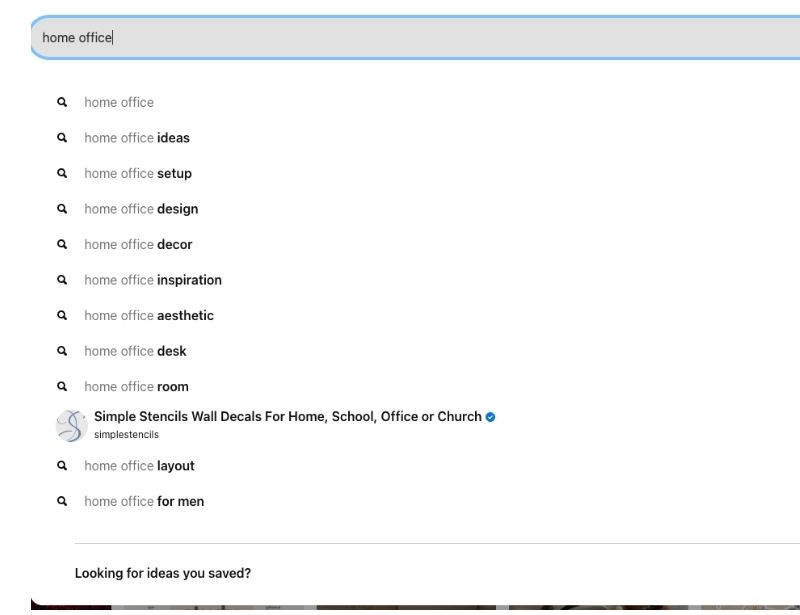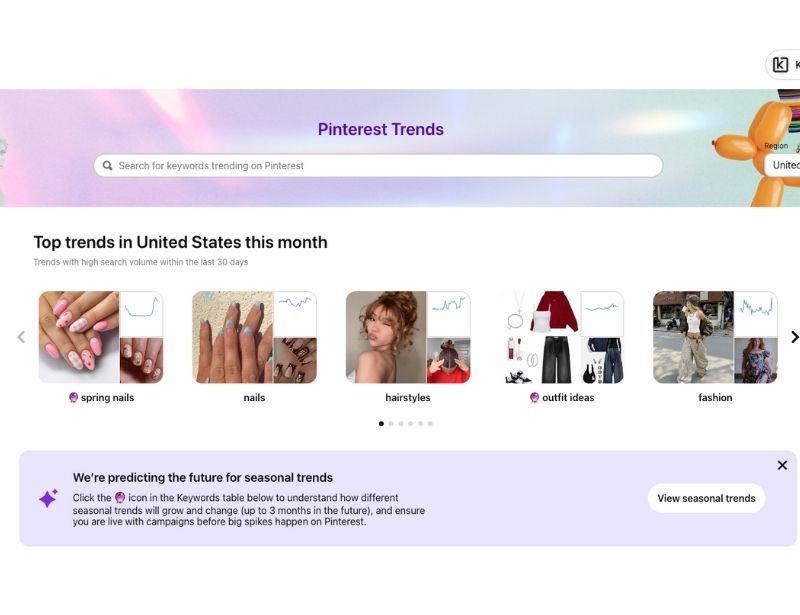The difference between invisible and unstoppable on Pinterest isn’t luck – it’s keyword research that actually works.
The platform with 500+ million monthly users is not just another social app. Pinterest is a search engine disguised as a vision board paradise. While everyone else treats it like Instagram’s contemplative cousin, smart creators know better.
I’ve spent years reverse-engineering Pinterest’s algorithm, and I’ve seen recycled advice that barely scratches the surface. So let’s cut through the noise, this is the only Pinterest keyword research tutorial you’ll need.
Why Keywords for Pinterest Matter
Pinterest isn’t TikTok. It’s not about dancing trends or virality. Pinterest is a deliberate, intent-based search platform where users look for specific solutions.
Consider this: 76% of Pinterest users discover brands while browsing, which is a staggering difference from platforms where users actively ignore advertising.
Without proper keyword research on Pinterest:
- Your pins disappear into the void
- Your target audience never finds you
- Your content strategy becomes a glorified guessing game
The Pinterest Search Engine: How It Works
Before diving into keyword tools, understand what makes Pinterest unique:
Pinterest’s algorithm prioritizes:
- Relevance – Does your pin match what users search for?
- Quality – Do people engage with your content?
- Recency – Fresh pins get priority in the distribution cycle
The backbone of this system? Keywords. Not just any keywords, but Pinterest keywords specifically tailored to how the platform categorizes and presents content.
Pinterest Keyword Research: The 5-Step System That Works
Let’s get tactical. Here’s my exact process for finding keywords that drive traffic.
1. Start With the Pinterest Search Bar
The search bar is a free Pinterest keyword tool that shows accurate results on users searches.
How to use it effectively:
- Use the search bar and type a broad term related to your niche
- Note the auto-complete suggestions
- Pay attention to Pinterest’s guided search categories that appear
For example, typing “home office” reveals people are searching for “home office ideas small space” and “home office design”, giving you immediate keyword ideas from Pinterest itself.

2. Use Pinterest Trends Tool (The Underutilized Weapon)
Their trends tool is free and helps you find what’s popular on Pinterest in the upcoming months. It shows the keyword search volume and seasonal patterns of related trends.
To access Pinterest Trends:
- Go to trends.pinterest.com
- You’ll need a Pinterest business account (free to create)
- Compare up to four keyword phrases
The data here shows not just what’s popular but when it’s popular, critical for planning your Pinterest marketing calendar.

3. Leverage Pinclicks (The Insider’s Keyword Tool)
While Pinterest’s native tools are valuable, serious Pinterest marketers need specialized firepower. I consider this the best Pinterest keyword tool.
Why Pinclicks stands out:
- This tool is where I find the best Pinterest keywords for my pins
- Shows keyword difficulty scores specific to Pinterest
- Offers related keyword suggestions you won’t find elsewhere
- Tracks trending topics before they appear on Pinterest Trends
Unlike generic SEO tools retrofitted for Pinterest, Pinclicks was built specifically for Pinterest keyword research, giving you the edge in understanding what Pinterest users are searching for.
How to maximize Pinclicks:
- Start with your main keyword
- Filter the Pinterest search results by search volume to find results related to your seed keyword
- Look for low-competition, high-volume keyword opportunities
- Export data to build comprehensive strategies based on these keywords
I’ve tested dozens of keyword tools, and for Pinterest specifically, the ROI on Pinclicks has been undeniable for finding the right keywords that convert.
4. Analyze Competitor Keywords (Reverse-Engineering Success)
Study what’s already working:
- Find top-performing pins in your niche
- Note the exact keywords they use in:
- Pin titles
- Descriptions
- Pinterest Boards name
Don’t reverse engineer what works, understand why these Pinterest keywords are performing well. Is it search volume? Low competition? Perfect alignment with user intent?
4. Expand Your Keyword Portfolio (Beyond the Obvious)
The best Pinterest keyword research includes:
- Primary keywords: The main search terms (e.g., “healthy recipes”)
- Long-tail keywords: Specific phrases (e.g., “quick healthy breakfast recipes for kids”)
- Related keywords: Adjacent interests (e.g., “meal prep containers”)
Use a tool like Pinterest’s keyword tool alternatives:
- Google Keyword Planner (for crossover potential)
- Keywordtool.io’s Pinterest section
- SEMrush’s “Questions” feature to find how people phrase queries
5. Validate With Real Search Results
This is where most guides stop, but the pros take it further:
- Enter your keyword in the Pinterest search bar
- Analyze the top-performing pins
- Look for patterns in:
- Content types that rank well
- Image styles that get featured
- Text overlay approaches
This tells you not just what keywords to use on Pinterest but how to use them effectively.
Where to Use Your Pinterest Keywords (Placement Matters)
Keyword research on Pinterest is only half the battle. Strategic placement determines whether Pinterest’s algorithm actually registers your content.
Essential keyword placement areas:
- Pin Titles (Most Important)
- Front-load your primary keyword
- Keep titles under 100 characters
- Example: “Pinterest Keyword Research: 5 Steps to Finding Viral Topics”
- Pin Descriptions
- Use 2-3 keyword phrases naturally
- Include a call to action
- Aim for 150-300 characters
- Board Names and Descriptions
- Use keyword-rich, clear board names
- Add relevant keywords to your board descriptions
- Example: “Pinterest SEO Strategy | Pinterest Marketing Tips”
- Your Pinterest Profile
- Include keywords in your business name
- Add your main keywords to your bio
- Use keyword-focused links
- Image File Names
- Rename files before uploading (pinterest-keyword-research.jpg)
Advanced Pinterest Keyword Research Tactics
For those ready to level up:
Keyword Clustering
Group related Pinterest keywords together to create comprehensive content clusters:
Primary: Pinterest Marketing
Cluster: Pinterest keyword research, Pinterest SEO, Pinterest business strategy, Pinterest trends analysisThis approach helps Pinterest understand your content’s depth and authority.
Seasonal Keyword Planning
Pinterest users search 2-3 months ahead of seasons and holidays. Use Pinterest Trends to identify when search volume spikes for seasonal terms.
For example, “Halloween costume ideas” starts trending in July, not October. Plan your keyword targeting accordingly.
Analyzing Search Intent
Not all Pinterest keywords have the same intent:
- Inspirational intent: “Dream home ideas”
- Informational intent: “How to paint kitchen cabinets”
- Transactional intent: “Best air fryers 2025”
Match your content to the intent behind the search term.
Common Pinterest Keyword Research Mistakes
Avoid these pitfalls that sink even experienced marketers:
- Keyword stuffing – Pinterest’s algorithm detects this manipulation
- Ignoring long-tail keywords – Often less competitive with higher conversion
- Using keyword tools made for Google – Pinterest’s search behavior is different
- Not refreshing keyword research – Trends change quarterly on Pinterest
- Focusing only on high-volume terms – Sometimes niche keywords convert better
Tools to Accelerate Your Pinterest Keyword Research
Beyond the free Pinterest keyword research methods:
- Tailwind – Keyword suggestions and trend analysis
- Pinterest Ads Manager – Keyword recommendations even if you don’t advertise
- Google Search Console – See what Pinterest traffic is already finding you
- Pinterest Analytics – Understand which keywords are currently working
The Pinterest Keyword Research Framework: Putting It All Together
Here’s my exact workflow for a new Pinterest account or campaign:
- Foundation: Identify 5-10 core “seed” keywords
- Expansion: Develop 20-30 related keyword phrases
- Validation: Check search volume and competition
- Implementation: Create content optimized for these terms
- Analysis: Track performance after 30 days
- Refinement: Double down on what works, pivot from what doesn’t
Conclusion: From Research to Results
Pinterest keyword research isn’t just a one-time task, it’s an ongoing process of discovery and optimization. The platform rewards those who understand not just what people search for, but how and when they search.
Remember:
- Pinterest is a search engine first, so search engine optimization is the key.
- Including your Pinterest keywords in your pins is important, as it connects your content to users with purchase intent
- Strategic placement outperforms volume every time
So if you’re building a Pinterest marketing strategy from scratch or optimizing an existing business account, keyword research on Pinterest is your foundation for sustainable growth.
The visual appeal might get attention, but it’s the keyword strategy that drives traffic from Pinterest, and ultimately, that’s what separates hobbyists from professionals on the platform.
Skip The Learning Curve: Get Expert Pinterest Help
Let’s be honest, reading about Pinterest keyword research is one thing. Implementing a system that drives traffic is another beast entirely.
Two paths forward:
Option 1: DIY with guidance
Book a free 30-minute strategy call where we’ll analyze your current Pinterest approach and identify your three highest-leverage keyword opportunities.
Option 2: Done-for-you Pinterest mastery
I’ll handle your entire Pinterest keyword strategy, from research to implementation. So you can focus on what you do best while your Pinterest traffic grows consistently month over month.







